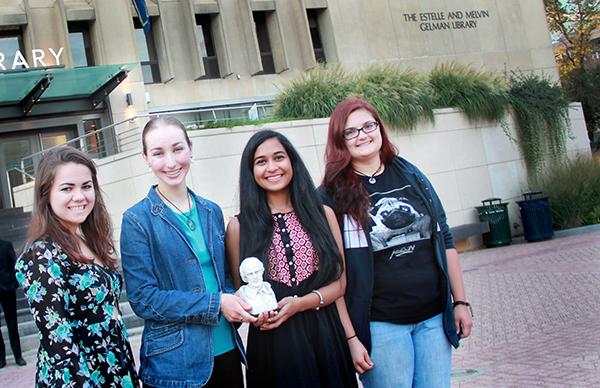Updated: Sept. 16, 2014 at 2:16 p.m.
The Residence Hall Association elections just got a bit more competitive.
This year, 230 students are running for about half as many open positions across several halls, creating the longest ballot in recent RHA history. Most halls have one or more students bidding to lead the hall’s programming and events.
Each hall has a president, vice president, programming chair, communications chair and treasurer. The number of candidates has increased since fall 2012, when there were 166 candidates, and last fall when 149 students ran.
“I think it speaks to people wanting to get more involved in RHA. I think it speaks to RHA wanting to be more involved on campus, improving its reputation but also getting itself out there as a resource for students,” said Ari Massefski, the group’s president.
Massefski said he “fully accepts” some hall councils will be more active than others, but he hopes that since more people are turning out this year, more will take the positions seriously instead of simply tacking it on to their résumés.
“It’s wrong to be elected to a position and do nothing, and it’s disappointing but it’s not life or death,” Massefski said. “The challenge will be to actually do something.”
Director of the Center for Student Engagement Tim Miller said in an email that he’s seen the RHA evolve over time, and that he was proud interest in the organization has grown this year.
“The RHA has done a great job reaching out to each of the halls and residents to encourage them to participate. The hall advisers will do an excellent job managing the new leaders in these buildings and we look forward to seeing what they will accomplish,” Miller said.
Unlike most organizations, the Student Association does not fund the RHA, which instead receives a $30,000 budget from the Center for Student Engagement. Each RHA hall council receives money to provide programming – typically free food – for its residents.
Junior Seth Gold said when he was president of The Dakota last year, he tried to engage students by setting up a “Cupcakes and Complaints” event in his hall.
“We’re all busy. I’m busy, you’re busy. I don’t want to take up your time because everyone’s time is important,” Gold said.
Zac Ruckert, the organization’s communications director who helped oversee the election process for several years, pointed to the new executive board – which is almost entirely made up of RHA outsiders – as a driving force behind the renewed interest in hall councils.
Ruckert has helped boost the organization’s email presence, sending out more reminders for applications to encourage students to apply. But he said Massefski’s personal touch with students has also made a difference.
“At a lot of the town halls for the elections, people know Ari already because he makes a lot of individual connections,” Ruckert said.
Massefski comes with a “wealth of knowledge” and well-established relationships with administrators, Ruckert said.
Before he stepped into the role of RHA president, Massefski was the director of new students during his sophomore year. He once knocked on every freshman’s door to talk about the issues they were facing at GW.
Massefski later spent a year as chief of staff for Student Association President Julia Susuni, and was part of the team that helped bring Student Health Service and the University Counseling Center to campus. He also served as the president of Francis Scott Key Hall his sophomore year.
“If there’s one thing I’ve learned, there are a lot of people who have opinions, and as hard as it is, everyone’s opinion is important because that’s our job is to be there for the community,” Massefski said.
During his time as FSK president, Massefski worked on the facilities committee, where he started the Twitter account @FixitComeFixIt so students could receive updates about their service requests. The account became popular among students, and is now run by the facilities department.
His Twitter prowess has now come in handy for the RHA: Ruckert said Massefski has taken over the group’s account and tweets at least five times a day. Massefski said he is constantly checking social media to make sure he responds to student concerns as quickly as possible.
“When there’s a housing issue a student’s having trouble with and they seek out help from the RHA, it’s the sort of thing where you don’t want to tweet back at them 10 hours later,” Massefski said.
This post was updated to reflect the following corrections:
In a caption, The Hatchet incorrectly referred to the Residence Hall Association as the Resident Hall Association. The Hatchet also incorrectly reported that Ari Massefski served as president of FSK hall last year. He served as president his sophomore year. We regret these errors.








